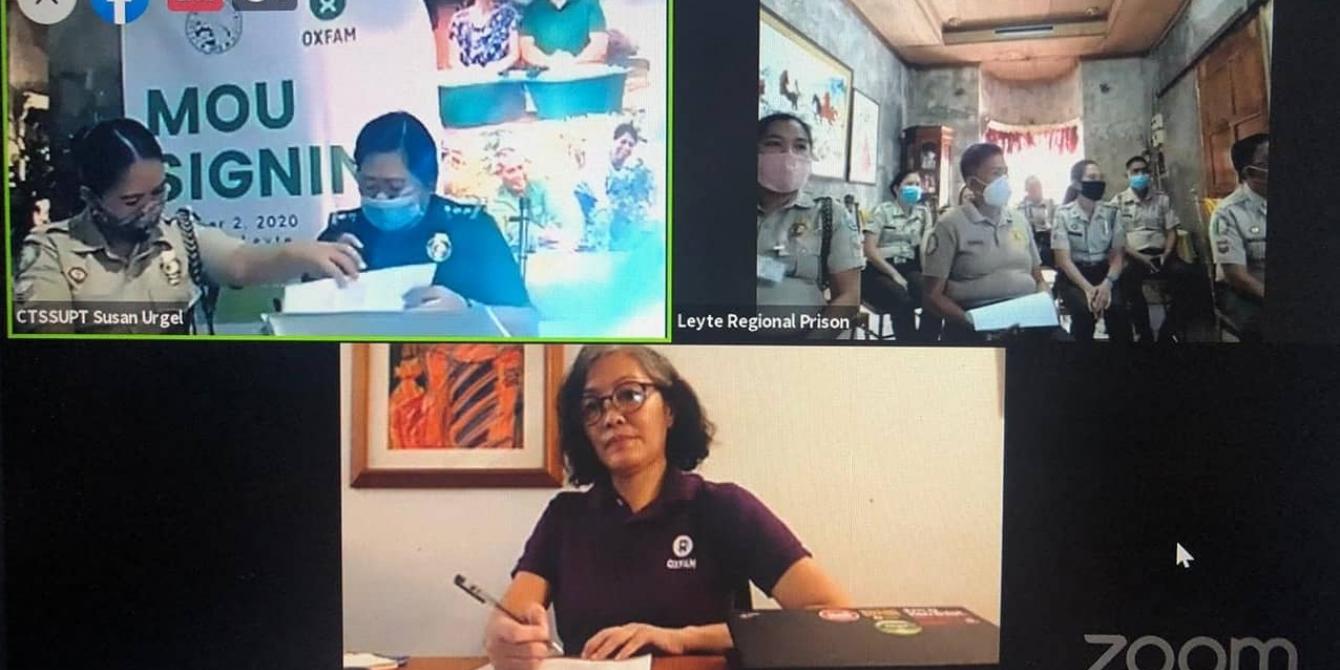Oxfam, BuCor to train inmates on care work and responsibility-sharing at home

As part of its advocacy to promote gender equality in the home setting, international humanitarian and development organization Oxfam partnered with the Bureau of Corrections (BuCor) to train inmates on the value of care work and why they should share this responsibility.
The trainees will include inmates or Persons Deprived of Liberty (PDL) set for release and reintegration in their communities.
The project will be integral to BuCor’s ‘Pre-Release Reintegration Program’ and will seek to strengthen the agency’s Gender and Development (GAD) program and ensure reformation and social integration of PDLs to become more productive law-abiding citizens and be care champions in their respective homes.
The partnership was made official on October 2, 2020, through the signing of a memorandum of understanding (MOU).
“Through this project, we are working with BuCor to increase the recognition of ‘care’ as valuable work and redistribute the responsibility of care work to become more equitable,” says Oxfam’s Resilience Portfolio Manager Leah Anadon-Payud.
“The message that care work is everyone’s responsibility will be part of reintegration programming. Men should be encouraged and supported to take up care roles, and governments and the private sector should incentivize them to do so. We are one with BuCor in aiming that inmates see the value in shared care when they return to their families and communities which will lead to parity in the division of household chores,” she adds.
The program includes the conduct of ‘Training of Trainers’ for Male Care Champions’ for selected PDLs identified by the Leyte Regional Prison (LRP). Due to quarantine restrictions, the training will be done virtually and will be attended by personnel of LRP’s External Affairs Section.
Oxfam will likewise share training materials to BuCor and LRP to conduct Unpaid Care Work-Care champion sessions.
Towards the end of the trainings, the LRP will also create a video of dancing inmates to the tune of 'I Laba Yu’, a content produced by Oxfam to raise public awareness on Unpaid Care Work.
For their part, BuCor-LRP is grateful for the partnership, which they called a “milestone” in the history of the agency.
“We are pleased to know that the BuCor is not alone in touching and changing the lives of PDLs, and instilling in them the love and respect for women and children. We are looking forward to an effective collaboration of this program for the sake of our brothers behind bars,” says CTSSUPT Dr. Susan Urgel, Deputy Superintendent for Reformation, BuCor-LRP.
This week, Oxfam served as a resource focal during a legislative inquiry in relation to Senate Resolution No. 446, which urges government to integrate a 'gender lens' into its COVID-19 programs, given the "disproportionate impact of the pandemic on women and girls."
Oxfam presented its recent findings on unpaid care and domestic work in the time of Covid-19 showing that parents – particularly those who are single and young as well as families living in poverty who are recipients of the government 4Ps program – are among those who spent more time each day on unpaid care and domestic work both before and during the pandemic.
Women in the Philippines are twice as likely to shoulder household tasks, such as childcare and cooking due to the Covid-19. Additionally, women are expected to be primary carers for the sick and those under quarantine.
Unpaid Care and Domestic Work (UCDW) is fundamental to human development and gender equality. It is a public and development issue and a private issue where women and girls' heavy and unequal workloads have remained unrecognized for so long.
“Almost half of the women we surveyed said they were feeling more anxious, depressed, overworked, isolated or physically ill because of their increased unpaid care and domestic workload during the pandemic. That is why we are urging the government to develop policy and programs to amplify issues on the recognition and redistribution of unpaid care and make the new normal equitable and gender-responsive, ends Payud.
###
References:
New research by Oxfam and partners reveals that while COVID-19 and the related containment efforts have caused increases in women’s – and men’s – unpaid care workloads, women are still doing the bulk of this work. More than half of the women Oxfam surveyed across five countries — the United States, the United Kingdom, Kenya, Canada, and the Philippines — say that they are spending more time on care work since the pandemic. This includes preparing meals, washing, and cleaning up, caring for young children and relatives. Specific to the Philippines, our data show that women are generally spending up to five more hours a day on unpaid care and domestic work.
- Read the “Care in the Time of Coronavirus” Report here: https://www.oxfam.org/en/research/care-time-coronavirus
- Read the position paper of Oxfam Philippines in connection with Philippine Senate Resolution No. 446 on the Gendered Dimensions of the Covid-19 Crisis, introduced by Senator Risa Hontiveros, here: bit.ly/36uAJbf

 Follow us on Facebook
Follow us on Facebook Instagram
Instagram Follow us on Twitter
Follow us on Twitter LinkedIn
LinkedIn